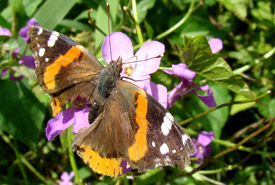Why does biodiversity matter? The diversity of life on Earth matters a lot…no matter how you look at it

Red admiral butterfly (Photo by NCC)
A question often asked, particularly by those who question whether too many resources are being spent on environmental protection, is "Why does biodiversity matter?"
Biodiversity, often thought of in terms of the number of species found in one place, also includes the diversity of genes and populations of a species, and may even encompass the diversity of communities and ecosystems across a region. Any naturalist, animal lover or other person who feels a deep connection with nature will tell you that biodiversity matters to them, and would likely suggest that it matters to everyone. They have many reasons for thinking this way, but is the value of biodiversity merely a matter of personal preference?
Some people value biodiversity with the same intensity and passion that others value art, music, or personal relationships, and it is difficult if not impossible to objectively compare these values. People may value biodiversity because it brings them peace or happiness to know that other forms of life exist. It may also cause them stress or pain to think about biodiversity loss through extinctions. There are also other people for whom the existence of a diversity of life does not matter a great deal, or at least is not as important as other preferences or values.
Such personal values and opinions of what matters are not the whole story. It has also been argued that biodiversity has intrinsic value, which is somewhat like stating that it matters to itself. The diversity of life has a value that cannot be measured in human terms, much in the same way that we are not willing to put a price tag on a person’s life. This concept may include the idea that all life has a right to exist, and extend as far as encompassing the value of processes that maintain biodiversity.
How and to what degree the intrinsic value of biodiversity matters is hotly debated. Certain forms of life, such as diseases or invasive species, may be considered nuisances by humans but could also be considered to have intrinsic value. Deciding how to treat such values in human terms is exceedingly difficult.
Beyond intrinsic values and personal preferences, biodiversity has great utilitarian value to humans. Fundamentally, our existence depends on other species, but the degree to which all species support the quality and sustainability of human life is debated. We frequently hear of the potentially unknown medicinal properties or technological innovations that could come from rare or undiscovered species.
There are already many species that support our society and economy through the ecosystem services they provide. We harvest many directly, including our crops, livestock and even wild species. Others support these species by feeding them, pollinating them or regulating their populations by preying on them when they become too common. Other species provide important services that we rarely consider — freshwater mussels filter our water as they feed; insects help to decompose rotting leaves and crops, creating the soil that nourishes the next generation of plants.
It is hard, if not impossible, to find a species that doesn’t have a role to play, but sometimes it seems as though many species share the same role. For example, a single lake may host more than a dozen species of minnows that feed predatory game fish.
Can we simply do without the majority of these? The different species in an ecosystem have evolved together in part because they keep each other from taking over and exhausting all of the resources. Though the concept of survival of the fittest suggests that species with similar roles will compete until one wins, the reality in many cases is that similar species coexist in spite of competition.
Just as our cities have back-up power generators and detour routes in case of emergencies, similar species in an ecosystem act as back-ups for each other. When one species declines, another similar species can increase to fill the gap that was left, often preventing major changes to all other species in the food web. Additionally, a diverse group of species may be able to more completely use the energy and nutrients in an ecosystem. This can make the system more productive overall, which is particularly important if we are harvesting what it produces (such as in commercial fisheries). Of course more species are not always better, and introduced species can disrupt stable relationships among native species.
If you think that all life has an intrinsic right to exist, and you personally value this existence for the peace that it brings you and sometimes the recreational opportunities to observe or interact with it, then the way in which we value biodiversity is aligned. But regardless of your take on the philosophical value of biodiversity, there can be no denying that biodiversity supports our society and economy by providing a wide range of services, and that it supports our environment by helping to maintain resilient and productive ecosystems.
Biodiversity may matter to each of us in different ways, but the bottom line is that it matters a lot…no matter how you look at it.


